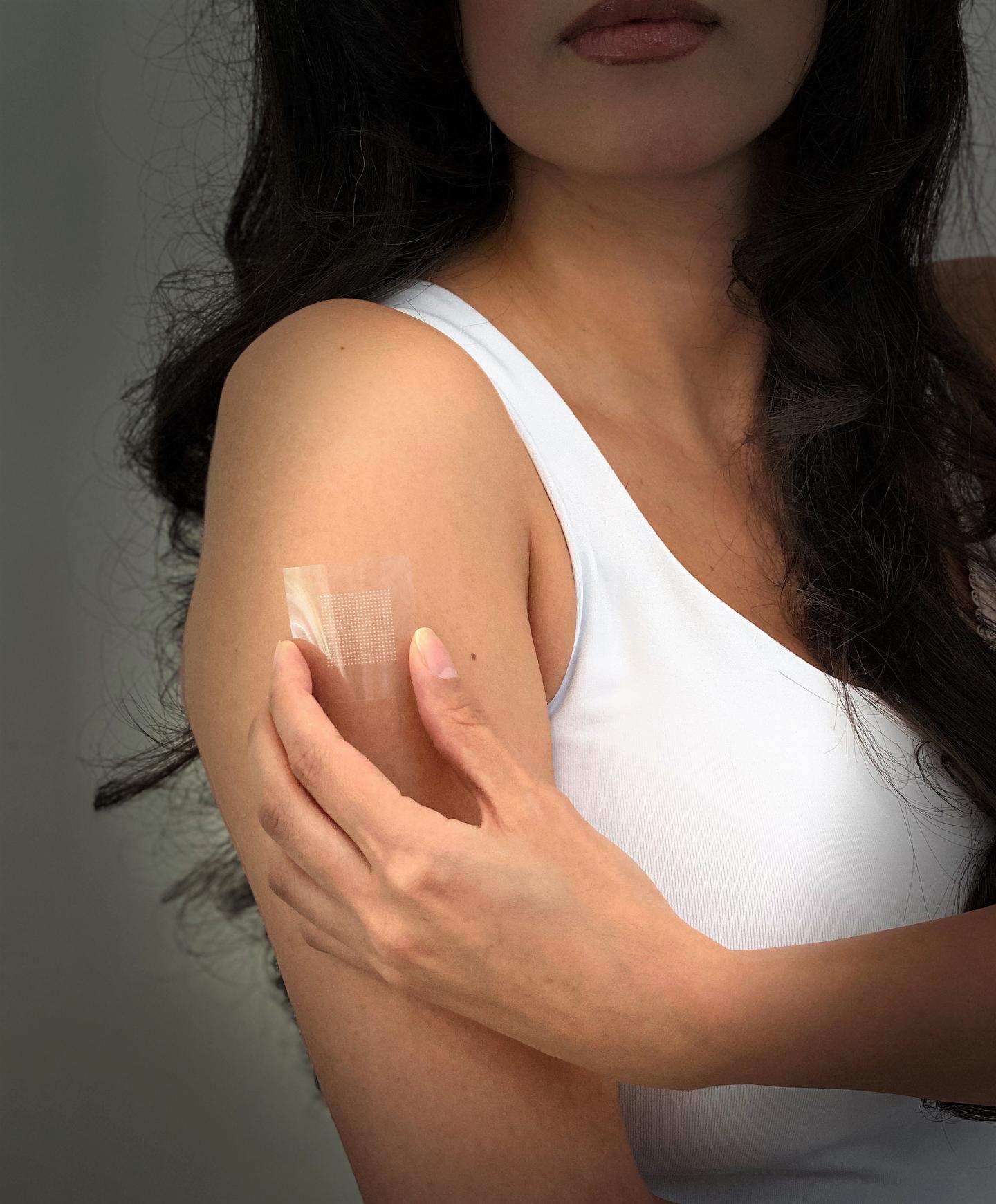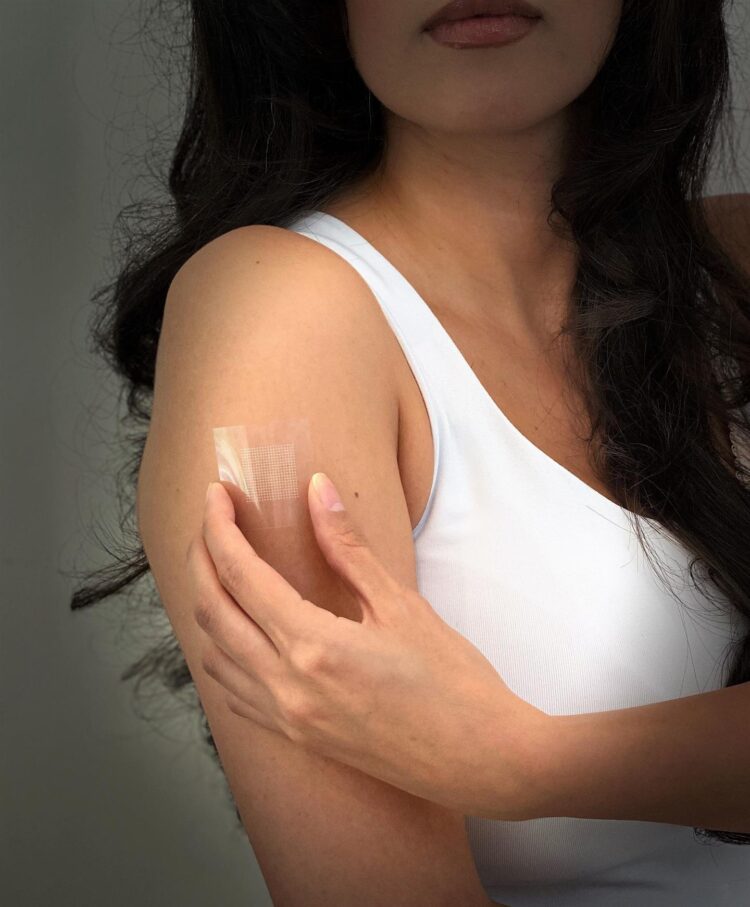Grant means tests can go ahead

Credit: Innoture
A revolutionary new way to give vaccines through microneedle skin patches is being tested at Swansea University, thanks to £200,000 of EU funding announced by the Welsh Government.
The COVID-19 pandemic is giving extra urgency to the search for vaccines and new ways of delivering them.
This important research is being conducted by Innoture, a leading UK company with expertise in applying medicines through the skin. This represents a significant milestone for Innoture, and further validation of their next-generation transdermal delivery system.
The innovative technology has the potential to make a meaningful difference to improve patient and public health in Wales and beyond.
Innoture have worked with Swansea University since 2012. The company’s R&D department is based in the University’s Institute of Life Sciences, where research has been conducted in collaboration with the University’s Centre for Nanohealth.
Traditional hypodermic needles can be frightening and painful for children and adults alike. Microneedles could improve patient compliance and therefore yield better health outcomes.
Microneedles are tiny needles, measured in millionths of a metre (μm), designed to deliver medicines through the skin. They have more in common with transdermal patches, such as those used to deliver nicotine to help people give up smoking, than with hypodermic needles.
The research will develop and test technology for delivering a vaccine dose via the skin. It will also test a simple and secure disposal process, which would allow the patches to be administered at home.
Dr Michael Graz, Chief Scientific Officer of Innoture, said:
“In the wake of the coronavirus pandemic, vaccine developers and manufacturers face a major challenge to rapidly develop and upscale their vaccination programmes as the demand for needles, glass vials plus other treatment delivery supplies, increases. Therefore, it is vital that alternative delivery options are considered by the UK – and international – health community.”
He added:
“‘Our transdermal delivery system has the potential to improve patient experience and significantly reduce the burden on the NHS and other healthcare systems. The patch is painless and minimally invasive for patients to self-administer.
At a time when self-isolation is necessary, the patch can be applied with ease in the home under guidance from a healthcare professional, reducing the need for people to attend a clinic. In addition, for healthcare professionals, it shortens consultation or appointment times and potentially removes the need for cold-chain storage.”
Research from Swansea University’s microneedle fabrication and transdermal testing facilities within the Centre for Nanohealth, is underpinning a host of microneedle technologies.
Prof. Owen Guy, Head of Chemistry and Director of the Centre for Nanohealth at Swansea University, said:
“Microneedle vaccine patches are an exciting development of Innoture’s transdermal patch technology”.
Dr. Sanjiv Sharma, Senior Lecturer in Medical Engineering at Swansea University, added:
“This project could provide a revolutionary approach to vaccination in the future. As a long-term partner of Innoture, we look forward to supporting this exciting venture”.
The award of £200,000 for the research comes from the Welsh Government via SMARTCymru 2014-2020 European Regional Development Fund, West Wales and the Valleys. This supports Welsh businesses to develop, implement and commercialise new products, processes and services.
###
Pictures:
- Transdermal patches: Innoture’s transdermal patch is ergonomically designed to be flexible to the body and easy to apply. The next-generation patches are designed to be effective and comfortable for patients to wear.
- Microstructure design: Innoture’s unique microstructure designs are small (less than 1mm) and minimally invasive. Innoture alter the design of each patch to the individual treatment to maximise the effect and improve results for patients.
Notes to editors:
Innoture: further information about their work
Swansea University is a world-class, research-led, dual campus university offering a first-class student experience and has one of the best employability rates of graduates in the UK. The University has the highest possible rating for teaching – the Gold rating in the Teaching Excellence Framework (TEF) in 2018 and was commended for its high proportions of students achieving consistently outstanding outcomes.
Swansea climbed 14 places to 31st in the Guardian University Guide 2019, making us Wales’ top ranked university, with one of the best success rates of graduates gaining employment in the UK and the same overall satisfaction level as the Number 1 ranked university.
The 2014 Research Excellence Framework (REF) 2014 results saw Swansea make the ‘biggest leap among research-intensive institutions’ in the UK (Times Higher Education, December 2014) and achieved its ambition to be a top 30 research University, soaring up the league table to 26th in the UK.
The University is in the top 300 best universities in the world, ranked in the 251-300 group in The Times Higher Education World University rankings 2018. Swansea University now has 23 main partners, awarding joint degrees and post-graduate qualifications.
The University was established in 1920 and was the first campus university in the UK. It currently offers around 350 undergraduate courses and 350 postgraduate courses to circa 20,000 undergraduate and postgraduate students. The University has ambitious expansion plans as it moves towards its centenary in 2020 and aims to continue to extend its global reach and realise its domestic and international potential.
Swansea University is a registered charity. No.1138342. Visit http://www.
For more information:
Kevin Sullivan, Swansea University Public Relations Office [email protected]
Follow us on Twitter: http://www.
Find us on Facebook: http://www.
Media Contact
Kevin Sullivan
[email protected]





